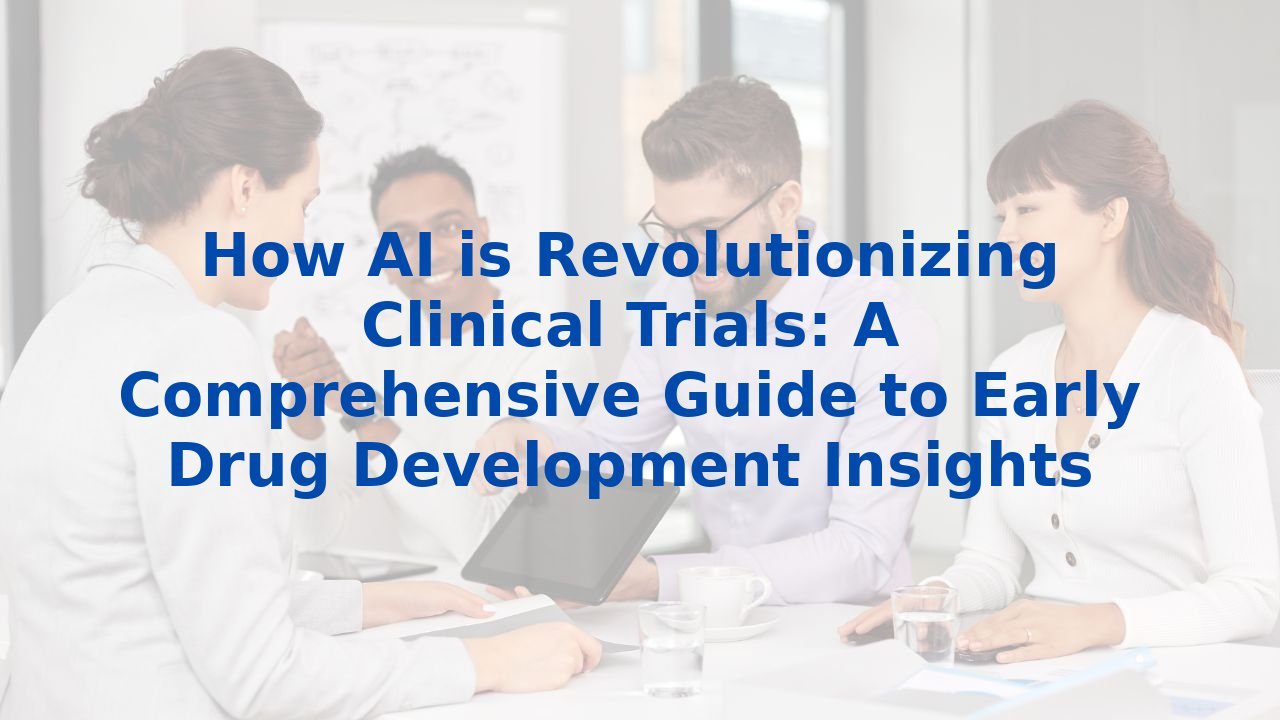How AI is Revolutionizing Clinical Trials: A Comprehensive Guide to Early Drug Development Insights
How AI is Revolutionizing Clinical Trials: A Comprehensive Guide to Early Drug Development Insights
Introduction
The pharmaceutical landscape is rapidly transforming, driven by technological advancements that reshape drug development processes. Central to this evolution is the integration of artificial intelligence (AI) into clinical trials. The ability to identify potential new uses for existing drugs at the earliest stages can significantly streamline drug development, making every therapeutic opportunity count. In this guide, we'll explore how AI enhances clinical trials and the crucial role of employee training in harnessing this transformative technology.
The Challenge of Late-Stage Discoveries
Historically, the pharmaceutical industry faced a significant challenge: valuable indications often surfaced too late in the drug development timeline. Traditional methodologies mainly focus on primary study endpoints, which can obscure secondary or tertiary benefits. Consequently, many breakthroughs were overlooked simply due to timing. This challenge calls for a fresh perspective—embracing AI, which can illuminate the pathways to potential drug applications that might otherwise slip through the cracks.
The Role of AI in Clinical Trials
AI is changing the rules of the game in clinical trials, offering powerful tools that elevate the entire process from start to finish:
- Data Collection and Analysis: AI algorithms are designed to sift through vast datasets, pinpointing patterns that may elude human researchers. By aggregating patient outcomes, side effects, and other relevant data points, AI ensures that every thread of information contributes to the broader narrative.
- Predictive Analytics: Machine learning models can analyze historical data alongside current results, allowing AI to forecast new therapeutic possibilities. This methodological shift empowers researchers to explore insights that traditional approaches often miss.
- Automated Data Management: AI's capabilities extend to automating the management of clinical trial information. This raises the bar for efficiency, as manual processes—which are prone to human error—give way to automated systems that enhance accuracy and detail capture.
- Enhanced Patient Monitoring: Real-time monitoring of patient health through AI opens new avenues for proactive care. This system ensures that beneficial and adverse outcomes are captured promptly, even as trial protocols may need to adapt dynamically.
Benefits of AI in Drug Development
The positive implications of incorporating AI into clinical trials are manifold, fundamentally altering the landscape of drug development:
- Early Detection of New Indications: AI’s capacity to analyze large datasets in real-time allows for the early identification of new drug uses. This vigilance significantly decreases the likelihood of missing valuable therapeutic avenues.
- Improved Patient Outcomes: Through AI-driven monitoring, issues can be addressed swiftly, leading to enhanced patient care. This fortifies the overall goal of achieving the best possible outcomes for participants while simultaneously enriching the trial’s data pool.
- Enhanced Efficiency: By automating routine tasks, AI liberates researchers to concentrate on strategic decision-making. This shift accelerates the development process, bringing innovations to market more rapidly.
The Importance of Training Employees for AI
The remarkable potential of AI is often underutilized if employees lack the necessary skills to leverage these technologies effectively. Implementing a robust training program is essential:
- Effective Utilization of AI: Comprehensive training allows employees to craft insightful queries and constructive prompts tailored for AI systems. This ensures that the data generated is of high relevance and actionable.
- Critical Evaluation: Employees equipped with the ability to critically assess AI outputs are crucial in maintaining data integrity. This skill enhances decision-making processes and aligns outcomes with organizational goals.
- Ethical Considerations: Training also encompasses the ethical dimensions of AI implementation in drug development, addressing ownership, privacy, and compliance. These discussions are pivotal in cultivating a responsible AI-driven culture.
Conclusion
The integration of AI within clinical trials is not merely a trend; it is a profound transformation that holds the potential to revolutionize the pharmaceutical sector. By harnessing AI's capabilities for data analysis and predictive insights, organizations can unearth new therapeutic opportunities earlier in the drug development journey. However, realizing AI’s benefits hinges on the caliber of training provided to teams. Investing in AI education enhances organizational effectiveness and ensures that every step taken in the drug development process is informed, innovative, and forward-thinking. This proactive approach will not only accelerate the path to market but will also firmly position organizations at the forefront of pharmaceutical advancements.



